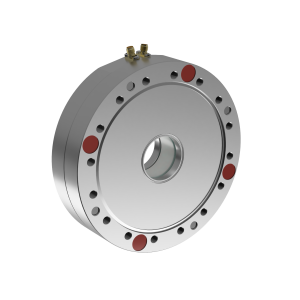Operating Principle
The Very Fast Current Transformer is based on an original idea from the 1970s for inductive beam position measurements. Via inductive coupling, the beam induces a current flowing on the surface of the vacuum chamber, the so-called wall current.
By cutting the vacuum chamber in segments equally distributed around the beam, the wall current becomes measurable by small current transformers placed around each of the segments. The sum of these individual signals is proportional to the beam current.
The internal structure of the VFCT differs considerably from normal current transformers. Resonances can be avoided. And a higher bandwidth can be reached. Yet, integration and especially length of the VFCT are like a standard current transformer.
Main features
- 1 V/A Sentivity
- Bandwidth up to 3 GHz
- Rise Time ≤ 115 ps
Downloads
Datasheets
User's manual
Papers
Technical Drawings
In-flange
Current price list
Integration
In-flange VFCT
- In-flange VFCT is mounted in the beam line
- Short axial length (40mm), includes a ceramic gap vacuum-brazed to kovar.
- Does not require bellows, wall current bypass nor electromagnetic shield.
- Available in CF6″ flanges with inner diameter of 34.9 mm. Ask Bergoz if you wish a different inner diameter
- Material AISI-304, 316LN on option
- UHV compatible
Environment
Temperature
- 100°C (212°F)
Core saturation
- 2 mT radial field
Radiation damage
- Standard SMA PTFE: 1 kGray max

